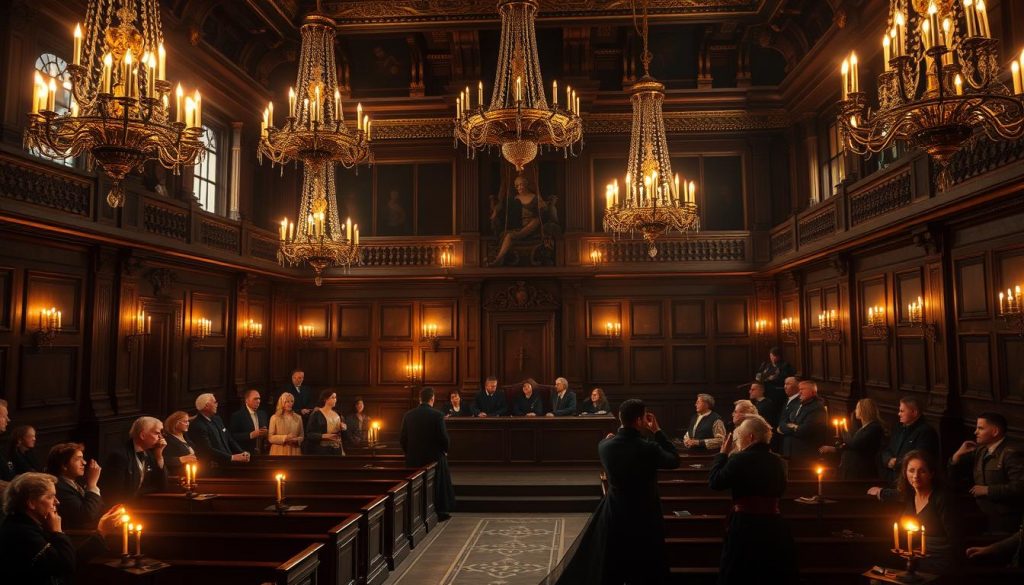The Affair of the Poisons: Scandal in the Court of Louis XIV
The Affair of the Poisons was a major scandal in 17th-century France. It happened in the late 1670s, during Louis XIV’s rule. This scandal shook the French aristocracy, revealing a world of intrigue, witchcraft, and murder.
Anúncios
Authorities, led by Nicolas de La Reynie, arrested 194 people. They came from all walks of life, from nobles to commoners. This was a huge investigation.
It started with strange deaths among the elite. The investigation grew, leading to the execution of 36 people. Marie de Brinvilliers was accused of killing over 30 for her experiments. La Voisin’s network might have caused up to 2,500 deaths.
This scandal shows how deep the fear of poisoning was. It also shows how far people went to achieve their goals. The court became tense, fearing sudden deaths. This event changed French history, revealing Versailles’ dark side.
Understanding the Affair of the Poisons
The Affair of the Poisons was a shocking poisoning scandal in France in the late 1670s. It showed how the elite relied on fortune-tellers and deadly potions. La Voisin, a key figure, was involved in sorcery, poisons, and dark rituals.
Anúncios
In 1675, a major incident started the inquiry, focusing on Madame de Brinvilliers’ trial. This event was a turning point, revealing deep corruption in the French aristocracy. The scandal included claims of up to 2500 child corpses in La Voisin’s backyard, though this is disputed.
The scandal led to widespread distrust in high society. La Voisin’s clients included aristocrats looking for love potions and deadly poisons. About 2000 people were caught up in the scandal, with nearly 100 arrested and 25 executed, including La Voisin.
The investigations showed how crime and social status intertwined in 17th-century France. King Louis XIV grew worried about his safety as the scandal’s impact spread.
Historical Context: France Under Louis XIV
From 1643 to 1715, Louis XIV ruled France, making it a leading power in 17th-century Europe. This period was a key time in French history. It saw the rise of absolute monarchy and a centralized government. Louis XIV, known as the “Sun King,” built a grand court at Versailles to display his power.
The political scene was complex, with the king and nobles vying for power. The strict court hierarchy led to a world of intrigue and rivalries. Seeking favor became dangerous, as rumors of poisoning spread, showing the nobles’ desperation to stay in power.
The late 1670s were marked by growing paranoia, leading to the Affair of the Poisons. This scandal was a result of the court’s turmoil. Survival depended on complex relationships, political alliances, and betrayal. Louis XIV’s rule showed the extremes of power and vulnerability, highlighting the strengths and suspicions of that time in French history.
Key Figures in the Scandal
The Affair of the Poisons was a major scandal during Louis XIV’s time. It involved several key people whose lives were deeply connected. Madame de Montespan, the king’s mistress, was at the center of it all. Her alleged role in the scandal shocked many at court.
Catherine Deshayes Monvoisin, known as La Voisin, was another important figure. She was a fortune teller and witch who sold potions and poisons to the wealthy, including royal court members. Her actions showed the dark side of Versailles, mixing magic, rituals, and betrayal.
Olympe Mancini, the Countess of Soissons, was also caught up in the scandal. She was part of the Mancini family and moved through the complex world of court politics. Her connections with influential people added to the scandal’s complexity, showing the ambition, betrayal, and power struggles at Louis XIV’s court.

The Role of Fortune Tellings and Poisons
The Affair of the Poisons showed how fortune tellers and poisons mixed in Louis XIV’s court. People like La Voisin became key figures. They used witchcraft, black masses, and love potions to attract followers.
This network turned dark, leading to many accusations of murder. It was a sinister turn.
Using poisons has a long history, dating back thousands of years. Egyptian texts from around 1500 BC mention it. By 400 BC, the Bible also talked about poisons.
In ancient Rome, poisonings were common. This led to laws against it. During the Renaissance, women like Catherine de Medici experimented with poisons.
The scandal grew after the Brinvilliers murder case in 1676. Family members were poisoned. It showed many high-ranking women were involved, thanks to La Voisin.
Plants like Belladonna and Digitalis were used by fortune tellers. They were used for both good and bad. King Louis XIV formed a commission to look into these poisonings. They wanted to keep the nobility’s reputation safe.
How the Investigation Unfolded
Nicolas de La Reynie, the police chief, led the investigation into the Affair of the Poisons. It started in early 1677 after accusations against fortune tellers came up. Many arrests followed, kicking off a wide judicial process to uncover the truth.
As the probe deepened, confessions shed light on the poison trade. These confessions were often obtained through threats and coercion. They revealed shocking details about famous people involved in these crimes.
The inquiry went beyond just looking at individual crimes. It showed a deeper moral decay among the elite. The investigation, led by Nicolas de La Reynie, aimed to face the dark secrets in Louis XIV’s court.
| Key Events | Date |
|---|---|
| Accusations against fortune tellers | Early 1677 |
| Start of Nicolas de La Reynie’s investigation | 1677 |
| Numerous arrests made | 1677 |
| Confessions extracted in court | Late 1677 |
| Discovery of moral decay among elites | Ongoing |
The Court of the Chambre Ardente
The Chambre Ardente was a special court set up in 1679. It dealt with the Affair of the Poisons. For over three years, it held trials for many poisoning cases that shocked France.
These trials showed the dark side of French society. The court looked into many cases, involving famous people. They were accused of using poison.
During these trials, the court took serious actions. They issued 319 subpoenas to find out the truth. They arrested 194 people, showing how big the scandal was.
In the end, the court sentenced 36 people to death. This made the Chambre Ardente a big topic of public interest.
One case, of Marie-Madeleine Marguerite D’Aubray, really caught people’s attention. It made everyone talk about social status and morality. The trial of Madame Montvoisin, known as La Voisin, also made the court famous. It showed the harsh punishments for those involved in the scandal.
| Statistics from the Chambre Ardente | Details |
|---|---|
| Years of Operation | 3 years |
| Subpoenas Issued | 319 |
| Individuals Arrested | 194 |
| Death Sentences | 36 |

The Implications of the Scandal
The Affair of the Poisons shook the court of Louis XIV deeply. It exposed weaknesses in the royal circle. Many people’s trust was shaken, leading to a climate of doubt among the elite.
As a result, powerful figures had to rethink their alliances. Loyalty was no longer a given, adding to the chaos.
The scandal’s effects were felt across French society. It didn’t just harm those directly involved. The whole nation started to doubt the ruling class.
People wondered about the true intentions of those in power. This led to a decline in trust in the monarchy. Louis XIV had to work hard to regain the people’s faith.
To fix the situation, the king took steps to restore order at court. He stopped some court activities to show he was taking action. These moves were a delicate balance between keeping power and being open.
Forgotten Conspiracies: The Dark Underbelly of Versailles
Under Versailles’ beautiful walls, a world of forgotten conspiracies and court intrigue existed. The palace’s grand look hid a place full of hidden plans. People plotted to get ahead or protect their interests.
The desire for power and ambition led to a dark world. Here, innocence was often lost to betrayal.
The Affair of the Poisons shows this hidden world well. People used poison and magic to get rid of their enemies. This showed the deep fears and doubts in the aristocracy.
In a place known for its beauty, lies and deceit thrived. This was a society built on secrets.
To understand Versailles’ court life, we must look at its complex dynamics. People sought power and fame, leading to secret alliances. Trust was hard to find in this world.
As people chased their dreams, they walked through a dangerous maze. Today’s friend could become tomorrow’s foe.
Looking into Versailles’ forgotten conspiracies reveals a story of intrigue and betrayal. It shows how ambition and fear shaped the era, even under the surface of great achievements.
Legal Ramifications and Sentencing
The Affair of the Poisons was a major legal event. It showed the big legal ramifications of conspiracy and related crimes. Hundreds of people were arrested, leading to many trials and executions.
36 people were executed for their roles in the scandal. Others got life sentences or were exiled. This showed how serious the situation was.
The scandal highlighted the use of conspiracy laws. These laws allowed for harsh penalties for planning or helping with crimes. This idea is still important in the justice system today.
Legal rules change a lot between states and the federal government. This affects the charges and sentencing. For example, federal law can lead to five years in prison for conspiring against the U.S. under 18 U.S. Code Section 371.
Georgia and Illinois have their own rules for conspiracy. These rules can make some crimes worse or give harsher penalties for others.
The Affair of the Poisons had a lasting impact. It set examples for how to deal with conspiracy in today’s legal world. This includes big cases that still happen today.
The Aftermath of the Scandal
The Affair of the Poisons had a big impact on Louis XIV’s court. After the trials, fear spread through France. People who used to hide in the shadows faced severe consequences.
Many important people lost their power and influence. They disappeared from the royal court. This scandal damaged the reputation of Louis XIV’s rule.
New rules were made to control fortune tellers and suspected poisoners. This was a response to the scandal. The fear and distrust it caused changed the way power was used in the future.
The effects of the scandal lasted long after it happened. Later rulers had to deal with a society that didn’t trust easily. The Affair of the Poisons left a lasting impact on how courts and people viewed power.
Conclusion
The Affair of the Poisons is a key moment in French history. It shows how fear and intrigue can reach the highest levels of society. This event highlights the thin line between trust and power.
The investigation into poisoning and conspiracy shook the rule of Louis XIV. It showed how personal desires can affect those in power. This had big effects on the kingdom.
The Affair of the Poisons’ impact is still felt today. It has shaped France’s view of justice and leadership. It teaches us about the importance of trust and how secrets can harm stability.
This event reminds us of the weaknesses in powerful institutions. Looking back at this time, we see the dangers that can hide in plain sight. It teaches us to always be cautious.
